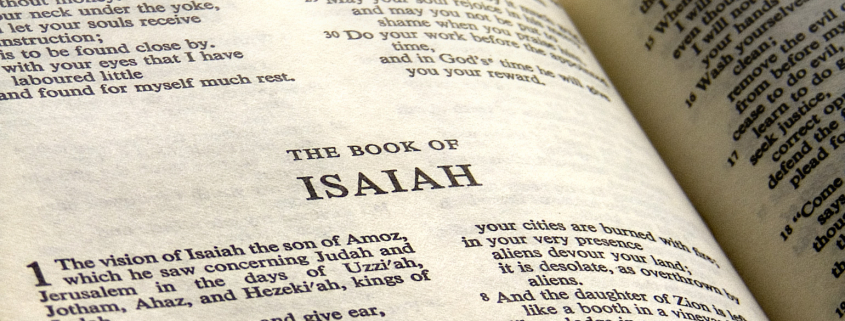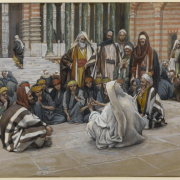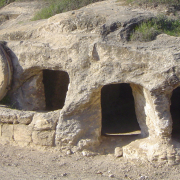What Does Isaiah 53 Have to Do with Jesus?
Isaiah 53 is an amazing chapter filled with significant prophecies about the Messiah. This chapter 1) provides specific details of how Messiah would suffer and die to take away our sins, 2) describes Messiah’s rejection by His own people, and 3) depicts Messiah’s glorious exaltation. Jesus fulfilled each of these prophecies. We would encourage you to follow along with the passage in an online Bible as we work our way through it.
1) Death and Atonement of Messiah
It is a beautiful thing that the God of the universe, the same one who created us, would give his life for us. Even while we rebel and sin against him, he still loves us!
The Torah teaches that since the penalty for sin is death, the only way to avoid that penalty is for an innocent sacrifice to die in our place. That is why God instituted the animal sacrificial system (Leviticus 17:11). These sacrifices served as a temporary covering for sin until God would take upon himself our sin by dying in our place.
Isaiah 53:5 describes the details of this sacrificial death: Messiah would be pierced for our transgressions, crushed for our sins, chastised for our peace, and wounded for our healing. Verse nine gives further detail that he would die like a criminal, even though He had done nothing wrong. Isaiah 53:10–11 shows that Messiah would be our guilt offering—something previously performed only in the sacrificial system at the Temple. He would remove our sins and give us His perfect righteousness.
Each of these details was fulfilled through Jesus. He came as a servant (Matthew 20:28) and lived a sinless life (1 Peter 2:21–23). He was pierced, crushed, chastised, and wounded, and His crucifixion was a criminal’s death (Matthew 27:27–44). His blood was poured out for the forgiveness of our sins (Matthew 26:28). He took away our sins, and by His wounds we are healed (1 Peter 2:24–25).
2) Rejection of Messiah
The chapter begins with two questions: “Who has believed what he has heard from us? And to whom has the arm of the Lord been revealed?” (Isaiah 53:1). This indicates that many would not believe in the Messiah. Verse three specifically states that Messiah would be despised and rejected by men.
Even though Jesus performed signs and miracles and fulfilled prophecies, many did not believe that He was the Messiah (John 12:37–38). Even today, many continue to reject Jesus as the Messiah who suffered and died for us.
3) Exaltation of Messiah
Isaiah 53 ends with the hope of the glorious exaltation of Messiah. Verse 10 foretells that Messiah would see His offspring, His life would be extended (through resurrection), and He would succeed in accomplishing God’s plan. And finally, verse 12 alludes to a mighty reward Messiah would receive.
Jesus did indeed rise from the dead, proving that He is victorious over sin and death (Matthew 28:1–10; 1 Corinthians 15:1–11). He succeeded in accomplishing God’s plan of redemption for us (1 John 2:2). Because of Messiah’s obedience to God’s will, God has highly exalted Him to the point that everyone should bow to the name of Jesus for the glory of God the Father (Daniel 7:13–14; Psalm 2:12; Philippians 2:8–11).
But why should we care?
Messiah loves you and has sacrificed so much for you. We hope you will get to know Him and begin to love him in return. This is the essence of the Torah, summarized in the Shema (Deuteronomy 6:4-5). But before we can apply the Messiah’s powerful love to our lives, we must first understand our need for Messiah; otherwise, he will not matter to you.
God created us to live in fellowship with Him. He loves us and wants us to love Him in return. However, there is a problem: God is holy, and we are not. The Bible is clear that we all have sinned (Ecclesiastes 7:20; Psalm 14:3) and that our sin separates us from God and breaks our fellowship with Him (Isaiah 59:2).
In fact, God takes sin so seriously that its consequences are death and eternal separation from Him (Daniel 12:2; Romans 6:23). But God, through Yeshua, loves us so much that He provided a way of salvation and redemption by dying in our place (Acts 20:28). If you want to be close to God, you need to trust Messiah Jesus to rescue you (Psalm 2:12; John 6:29). This involves repenting of your sins and asking Jesus to forgive you for all you have done. As one of Jesus’ closest followers knew from experience, “If we confess our sins, he is faithful and just to forgive us our sins and to cleanse us from all unrighteousness” (1 John 1:9).
Now what?
We are ultimately left with a choice. Will we continue in our rebellion against God and follow our sin to eternal separation from Him? Or will we choose to believe in God’s way of salvation through the loving sacrifice of Messiah Jesus? He is our only hope of restoration into fellowship with God.





 Public Domain
Public Domain Brian Crawford
Brian Crawford
